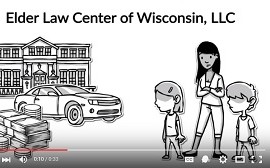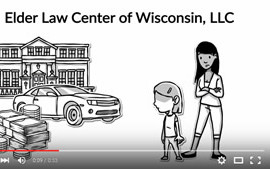Frequently Asked Questions
Are my assets safe in a Revocable Living Trust from Medicaid?
No. General rule of law holds that whatever you can access, others may access as well. Assets in a Revocable Living Trust are open and available to you; therefore, they are also open and available to Medicaid. What would make your assets safe is an Irrevocable Trust. The Irrevocable Trust allows you to protect your assets from Medicaid. For details on this and other Medicaid Planning Issues, contact us today.
Learn more about estate planning options available from the Elder Law Center of Wisconsin.
If one of us is already in a nursing home, is it too late to protect our assets?
No. It is never too late to protect your assets. The sooner you get started with Medicaid Planning the more you can protect. Contact us today to find out more.
Can I protect assets by transferring them to my kids?
No. Besides the obvious five year look back period, if your children get into financial trouble, the assets become available to their creditors. If your children go through divorce, the assets may become available to their spouses through divorce settlements. If your children have health problems, the assets may be at risk, as well. There may also be significant negative income, capital gain and gift tax consequences in gifting assets. In any case, by transferring your assets, you are losing control of them. For more information on asset protection options, contact us today.
I hold joint accounts with my kids. Are they safe?
No. Medicaid treats any asset with your name on it as yours unless you can overtly prove that the joint owner actually contributed assets to the account. To learn more about options for asset protection, contact us today.
Why do I need estate planning?
Simply put, effective estate planning is the best way to ensure that you will be able to control your property while you’re alive and well, provide for your loved ones and yourself if you become disabled, and leave your assets when you die to whom you want, when you want, and the way that you want.
Every state has laws that govern what becomes of your assets if you die or become disabled. But the government also allows you to establish your own set of rules that supercede those laws, if you so choose. The process of establishing your rules is called estate planning. So, for instance, while the state may require your will to go through probate, you can choose to spare your heirs this drawn-out and expensive legal process. But you can only do it through estate planning.
Why should I go to Elder Law Center of Wisconsin to establish a trust?
Not all trusts are created equal. Trusts are unique legal documents that provide for the protection and preservation of your assets, with specific attention to the requirements of Medicaid qualification. The trust will be drafted according to your specific goals. We have drafted thousands of trusts and specialize in this area. We can explain the different options you have in language that is understandable.
What’s the difference between Medicare and Medicaid?
Medicare is health insurance for people over sixty-five or disabled. It pays for hospital stays, doctor visits, and medical tests. It covers only limited skilled nursing care. Medicaid is a social health care plan for people with low income and limited resources who meet certain economic criteria for eligibility – it does cover the long term costs of nursing care in a nursing home ONLY.
What is Medicaid Planning?
Medicaid Planning involves developing a plan to reallocate your assets in such a way that Medicaid will not take them into consideration when determining your eligibility for coverage. If nursing home care is needed in the future, you can qualify to have Medicaid pay for the cost of care, rather than depleting your own resources to cover these costs.
How can we find out if we’re eligible for Medicaid coverage?
Medicaid eligibility is based on the amount of your monthly income and your assets. At Elder Law Center of Wisconsin we are experts in Medicaid law and know how to ensure you qualify for coverage in the shortest time possible.
If my spouse goes into a nursing home, will I have to give away all or most of my assets to keep them from being taken to cover the costs of care?
This question goes to the heart of our Estate Planning mission. Elder Law Center of Wisconsin uses an assortment of asset protection plans (depending on your particular situation) to ensure your assets will not be taken to cover the cost of nursing home care. Our trusts permit you to maintain full control and access to your income while ensuring your assets are not counted towards your eligibility for Medicaid.
Why do I need help obtaining Medicaid coverage? Isn’t it just a matter of submitting the application?
Many people apply for coverage without any help, but Medicaid will not tell you how to protect your assets. What Elder Law Center of Wisconsin offers is its specialized knowledge, skill, and experience to help you follow all the proper application procedures, and handle all of the necessary legal correspondence. More importantly, we offer a range of options for protecting your assets, should you need nursing home care. We will see your case through to its conclusion and work hard to produce a positive outcome for you and your family.
I’ve heard Medicaid can take our house for reimbursement. Is that true?
No, they cannot take your house, nor do they want to. This is one myth regarding Medicaid. While Medicaid does require the spouses of beneficiaries to contribute some portion of their available assets to the cost of care, the federal Spousal Impoverishment Protection law excludes your family home from that calculation while a spouse resides there. There are several options available to protect your house from estate recovery if one dies while on medicaid or family care.
If my spouse goes into a nursing home, will I have to give away most or all of my assets in order to protect them from being taken to cover the cost of care?
No. This is another myth regarding Medicaid. Under federal Spousal Impoverishment Protection rules, you can receive Medicaid benefits and retain your home, your vehicle, your household effects, and “countable” assets up to a state-determined maximum. Request a free Medicaid Planning brochure.
What is a Health Care Power of Attorney?
It is a document that empowers someone else to make health care decisions for you in the event that you have lost the capacity to make those decisions yourself, due to some disability. Bear in mind that, in many states, the decision of whether or not to administer care to someone who is incapacitated automatically defaults to the physician, not the spouse, unless you have it in writing that you want someone else to have that power. Having Elder Law Center of Wisconsin prepare a health care Power of Attorney for you is a good way to ensure that your decisions are being implemented by someone you trust and that your specific wishes with respect to medical intervention are spelled out in unambiguous detail.
What is a Power of Attorney?
Power of attorney is a document that authorizes someone else to make legal decisions on your behalf in the event you are unable to make them yourself – decisions and actions such as paying bills, selling real estate, accessing bank accounts, and so on. There are several different types:
> Durable Power of Attorney – The legal authority is valid after (and before if desired) you become disabled.
> Asset Protection Power of Attorney – This type of power of attorney gives your Agent the authority to protect assets, gifting, making financial decisions etc.
Bear in mind that power of attorney documents are valid when notarized. One important goal of this designation is to provide specific instructions consistent with your estate plan, so that important planning decisions you have made cannot be undone through use of Power of Attorney. The standard statutory Power of Attorney used by most lawyers are insufficient to protect your assets or to do estate planning if you become incapacitated. It is critical your Power of Attorney contain the necessary language to authorize all authority needed.
I can buy a Power of Attorney form at the office supply store/online for a couple of bucks. Why should I go to you?
The Power of Attorney form you buy at a stationery store is just the basic, standard form. It does not accommodate your wishes in any detail. When Elder Law Center of Wisconsin prepares a Power of Attorney document for you, it is custom tailored to your purposes, with specific instructions for your agent with respect to a broad range of planning issues, including:
> The creation of trusts
> Asset protection for your spouse before and after your death
> Asset protection for your children from creditors or divorce
> Prevention of business failure
> Information about finances and distributions
> Instructions on privacy
…and more. This is a detailed legal document of the type you cannot obtain off the shelf at the local store. It is VERY different from the standard Wisconsin Financial Power of Attorney which is ineffective for protecting assets.
What is a Will?
A will is a legal document that deals specifically with the distribution of your assets after your death. A will does go through probate.
What is a Trust?
Here is our explanation: A trust is like a limousine. Silly answer? Think about it…
Imagine for a moment that all of your assets are boxes – your home is a box, your car is a box, your bank account is a box, and so on. You have this stack of “boxes” you’re carrying in your hands as you walk through life. If you should trip and fall (i.e. die or become disabled), what happens to the “boxes”? They fall all over the place, and you need a lawyer to help you gather them all up. If you’re alive and disabled, the “boxes” are picked up by your Power of Attorney. If you’re dead, they can be picked up by your executor after your heirs go to probate court.
You can avoid all that with a trust. When you establish a trust, it’s like getting a limousine to put your “boxes” (or assets) in. They all fit inside the limousine, nice and snug. You have total control over what goes in the limousine, where it goes, etc. If something should happen to you, the only thing you drop is the steering wheel. The “boxes” (your assets) are all still safely tucked inside the limousine.
Now, in the glove box of the limousine is your book of instructions. These instructions spell out in very specific terms what you want to have happen if you can no longer control your limousine full of assets. That is what a trust is, your book of instructions that keeps your assets together, and establishes a plan for what happens to them if you should become incapacitated or after you die.


